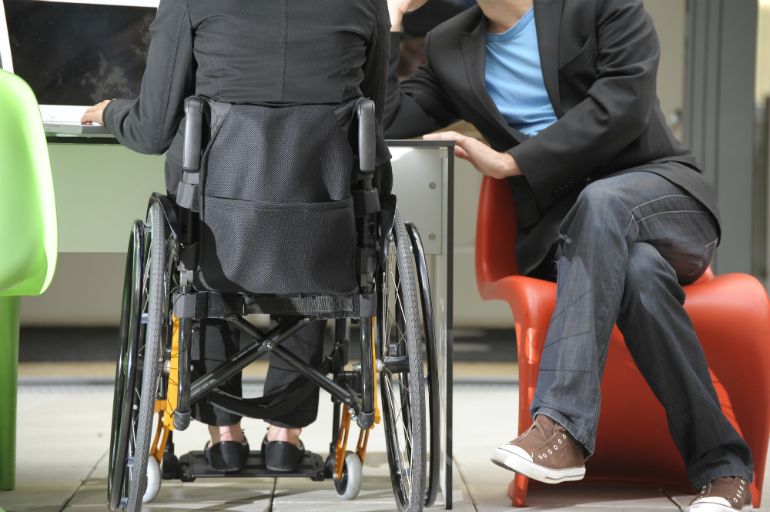
Life can be very challenging in the workplace for people with disabilities. In decades gone by, those with disabilities may have really struggled because the workplace was not adapted to their needs, making it difficult to get around. In some cases, areas of the workplace may have been inaccessible. In addition, there were no special facilities catering to those with disabilities, simply because there were not stringent regulations in place.
Fortunately, over the years things have changed and there is now strict regulation relating to adapting the workplace for those with disabilities. Equality in the workplace has become a very important issue and part of this is to ensure that business premises are suited and equipped for employees with disabilities. Failure to ensure this could lead to serious consequences for businesses, which is why it is vital to ensure the workplace is adapted in line with current legislation and regulations.
Some Key Ways to Adapt the Workplace
There are various ways in which employers can adapt the workplace in order to cater to the needs of employees with disabilities. Many employers fail to think outside the box and focus only on tangible adaptations such as ramps, wider doors, and special furniture. However, they should remember that adapting the workplace also has to stretch to flexibility. For instance, companies must be flexible and provide the employee with the time required to attend medical appointments and assessments as and when necessary.
Let's take a look at some of the key ways in which employers should adapt the workplace for employees with disabilities:
- Improving access to all parts of the building
- Eliminating physical barriers
- Adapting work areas to suit the needs of the individual
- Addressing issues with lighting and furniture
- Providing disabled facilities
- Being flexible with hours to allow for medical appointments
These are some of the key ways in which employers can cater to the needs of those with disabilities. However, it is important to remember that it is not just physical disabilities that have to be taken into consideration but also mental health conditions. For instance, guidelines from the government recommend that someone who suffers from Social Anxiety Disorder should not be made to hot-desk and should be allowed to have their own desk.

A Closer Look at Some Possible Changes
The government issues comprehensive guidelines and regulations when it comes to catering to those with physical or mental disabilities in the workplace. Employers need to bear in mind that this applies not just to regular employees but also apprentices, trainees, contract employees, and partners. It is the employer's duty to make reasonable adjustments to ensure equality for disabled employees.
Let's take a look at some of those reasonable adjustments:
Recruitment
The first place to start with changes and adaptations is with the recruitment process. Employers must ensure diversity for all, which means ensuring their recruitment process does not discriminate in any way against applicants with disabilities.
Flexibility
Employers also need to ensure they provide a flexible approach for people with disabilities. This includes allowing time for medical visits and appointments, allowing them to work from a lower floor in the building if they need to, and not making those with physical or mental disabilities hot-desk if this causes issues for them.
Physical changes
Employers also need to look at physical changes in the workplace to ensure there are no physical barriers and that areas are accessible for employees with disabilities. This could include things such as installing ramps and having wider wheelchair-accessible doors. In addition, they may also need to make changes for safety reasons such as the installation of audio-visual alarms for those with hearing problems.
Equipment and furniture changes
Another vital area employers need to look at is appropriate equipment and furniture adaptations to help employees with disabilities. For instance, if they have an employee with severe arthritis, they may need to get a special keyboard. If they have an employee with spinal issues, they need to ensure they invest in a suitable ergonomically designed chair to ensure their comfort and safety.
Providing suitable facilities
Naturally, it is important to ensure the workplace is adapted to provide suitable facilities for employees with disabilities. This includes recreational and refreshment facilities as well as disabled toilet facilities, among others.
The Equality and Human Rights Commission
The Equality and Human Rights Commission has clear guidelines and information relating to making changes in the workplace to cater to the needs of disabled employees. The Commission advises that reasonable changes must be made to the workplace to ensure that disabled employees have the same accessibility and facilities as their able-bodied peers.
The Commission also highlights the importance of ensuring any obstacles, physical or otherwise, are removed, reduced, or prevented if they cause an issue for employees with disabilities. The adjustments employees make to their business premises need to be reasonable ones. According to the Commission, the definition of reasonable is dependent upon various factors, such as the size and type of business.
If employers are uncertain about any aspect of making workplace adjustments to cater to employees with disabilities, it is always best for them to check with the Commission.
Making Business Accessible to All
By making key changes and adaptations to business premises and working practices, employers can ensure their business is accessible to all. This ensures employers are exercising equality and adhering to legal regulations, but also that they do not lose valuable staff members with disabilities simply because they have failed to cater to their needs.
Most of the stories here on LiveQuickie.com were submitted by readers. Do you have a story to tell? We'd love to hear it. Submit your story here.